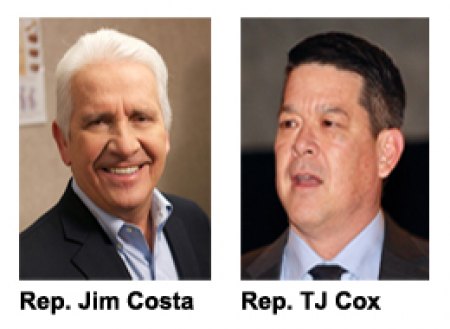Representatives Jim Costa, TJ Cox work to ensure reliable water supplies for California
There is no silver bullet that will solve these problems, but what we know is this: all parties must be at the table; the legislative process must be transparent; the goals must be clear and achievable.
California has an incredible opportunity to achieve what has seemed out of reach for so long: responsibly providing safe, reliable, and adequate water supplies for nearly 40 million Californians; water for California farmland that produces almost half of the nation’s fresh fruits, nuts and vegetables; and water for native fish and wildlife. The delivery of Delta water is critical to San Joaquin Valley communities that suffer from dry wells and poor water quality. In fact, the San Joaquin Valley is home to half of all community water systems in California that lack access to clean drinking water.
We applaud Gov. Gavin Newsom’s efforts in leading discussions with the United States Department of the Interior, public water agencies and environmental groups to craft voluntary agreements that will restore the ecological health of the Sacramento-San Joaquin Delta while providing California with clean, reliable water.
Additionally, the state and federal administrations are working cooperatively to update biological opinions issued under the federal Endangered Species Act for the coordinated operations of the California State Water Project and the federal Central Valley Project. The current biological opinions were issued a decade ago. It is time to update them to incorporate the new science and adaptive management approach that has been developed in the years since and that served as the basis for the Water Infrastructure Improvements for the Nation (WIIN) Act, bipartisan legislation approved by Congress and signed by President Barack Obama in December 2016.
Evidence suggests that the new biological opinions being developed by the federal fishery agencies could provide greater protection for Delta smelt, Chinook salmon, and other anadromous fish than the existing biological opinions, issued in 2008 and 2009. For instance, under the new biological opinions, Shasta Reservoir will be operated to provide more cold water to protect winter run Chinook salmon that spawn below Shasta Dam.
Blowing up this process by enacting the Endangered Species Act provisions of Senate Bill 1 would likely result in the major parties walking away from the governor’s collaborative process. Instead of working together, we’ll return to the status quo of conflict resolution by lawsuit. Clearly this would be a step backward to solving our long-term water issues.
Unless SB 1 is amended, it would codify in state law the outdated 2008 and 2009 biological opinions, which should be replaced with a new biological opinion that utilizes the latest data and methods. Additionally, SB 1 attempts to apply the state Endangered Species Act to operations of the federal Central Valley Project, which has been a historical point of legal contention. This could result in litigation that extends beyond the Trump administration, regardless of the outcome of the 2020 presidential election. From our experience, litigation in the water world does not resolve California’s long-term water challenges.
We absolutely support SB1’s objective, which is to ensure that the Trump administration does not roll back regulatory protections for quality health care, immigration, fair labor, clean air, clean water, and at-risk fish and wildlife species. But unless amended, the unintended consequences of SB 1 will surely frustrate Gov. Newsom’s efforts to reach solutions through collaboration and engagement with all participating parties.
Efforts to meet all of California’s water demands present complex issues that don’t lend themselves well to sound bites. The future management of California’s water system demands that we incorporate the best available science in making operational decisions that impact water supplies for California’s people and its environment. The voluntary agreements being advanced by Gov. Newsom’s administration and new biological opinions that provide greater operational flexibility and better protection for at-risk species are positive steps toward responsible water policy. SB 1, in its present form, is a step backward. This measure can, and should, be fixed.
Congressman Jim Costa, D-Fresno, represents California’s 16th District; Congressman TJ Cox, D-Fresno, represents the 21st District.
Opinion
- Valadao supports rural cooperatives, communities with legislation
- Kings Democrats condemn vandalism at Rep. Valadao's Hanford office
- Breaking down barriers to care and protecting seniors' well being
- A public perspective on health care and Medicare Advantage
- The Leader recommends Lupe Solis, Joe Neves be returned to local elected positions
- Westlands Water District celebrates 70th anniversary in San Joaquin Valley
_0.jpg)

.jpg)





